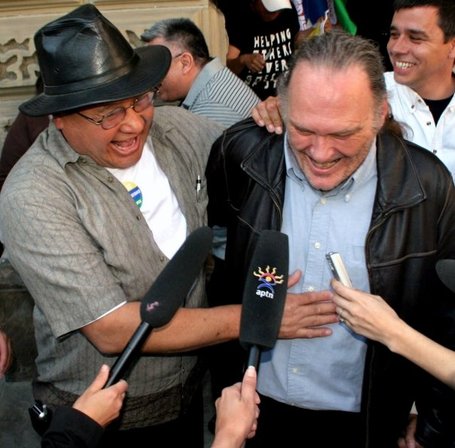|
Adoption or Allyship in the Contemporary Algonquin Context I am of the thought that in the contemporary context community adoption as a cultural practice must be reconsidered, where principled allyship is the better alternative. Otherwise, the practice of community adoption will exist only to be spun by spin doctors as the new form of interference. Learning through Introspection is Indigenous Before I begin it is important for me to offer that existing within the context of a section 15 Charter challenge, and within the context of the contemporary land claims and self-government process best known as a termination process (Russell Diabo), I have been exposed to some very grounded and puzzling human dynamics. When I introspect on these dynamics, and the things that puzzle me the most, sometimes knowledge emerges that will not be received well. Many people will not immediately understand the deeper meaning inherent and therefore will not understand why I offer my insights gained. Ultimately, knowledge is a relationship and as such I ask that readers take the time and establish a relationship to this knowledge rather than being quick to judge. We Adopted Historically Historically, Indigenous nations readily adopted other people into their nations in that, among other things, they greatly valued the alliance gained and the genetic diversity that came with the new members. While historically Indigenous nations adopted and assimilated other people, in a contemporary sense I have noticed that this practice of adoption embodies an undermining contradiction, and thus has limitations. I say this because in the contemporary context adopted people are challenged by jealous or dissenting community members and easily discredited as not really being speakers for the nation. In this process of discrediting adopted members it becomes apparent that they are not really accepted as full members. Outrageous Initiation Requirements I have found that when people are adopted they are placed in the situation where they have to do outrageous things, as a rite of passage so to speak, to prove their loyalty to the nation. This exists, I have noticed, as an unspoken requirement. One such example is the new member ends up in prison in defending the nation’s rights. Through these “initiation requirements”, these adopted people are vulnerable, become symbolic icons of the nation, yet contradictorily they lack the genuine power needed when speaking for pressing issues of the nation. Today We Discredit Adopted Members One of the most well known Algonquin today is retired Ardoch Algonquin First Nation and Allies Chief Robert (Bob) Lovelace, and rightly so as he has certainly proved his loyalty to the Algonquin and our land and waterscapes when in 2008 he went to prison to protect it from uranium mining and its ill effects. Lovelace has also encouraged and guided the production of several academic research projects that will serve future generations of Algonquin. It is important, though, that I point out here that as an adopted Algonquin Lovelace does not have the lived knowledge of being Algonquin since childhood, or the lived knowledge of being Algonquin inter-generationally speaking. Regardless, he does have knowledge of colonization and what it has done to the Algonquin. Despite his proven loyalty I have noticed that when Lovelace speaks up on Algonquin issues, many people – Algonquin included – are far too quick to discredit him as not really being an Algonquin in terms of his genetic material and blood lines. This is because we no longer really value adoption as a governance tradition. This situation of discrediting, I think, is a barrier and stifles Lovelace’s potential from doing what he could do best: speak out against the current Algonquin land claims and self-government settlement offer of 1.3% of the land and a $300 million one-time payment, and being heard and understood in a way that other Algonquin cannot. A Limiting Contradiction While this is the situation, at the same time many people gravitate toward Lovelace as a knowledge holder of Indigenous knowledge and truth - even on an international sense. Certainly in some ways he has been a teacher to me. It is in this way that he, and his adoption, embodies a very limiting contradiction, and it is in this way that in the contemporary context, adoption is a barrier to hearing what he has to say about Algonquin issues and concerns. It is precisely for this reason that it is my contention that principled allyship versus adoption is the better choice in the contemporary context. We need to remove the barriers that are silencing important voices such as Bob's. This blog requires a huge qualification. Robert Lovelace is an important person and his commitment to the Algonquin, Indigenous cause, and the earth is clear to me. This analysis should not be interpreted as me not valuing who he is and what he has done for the Algonquin. Lastly, it is Robert’s thought that I should offer this analysis. More precisely it is his thought that this blog could stimulate the needed discussion, which could then lead to collective thinking, where collective thinking could lead to consensus, and so on …  Lynn Gehl, Ph.D. is an Algonquin Anishinaabe-kwe from the Ottawa River Valley. She has a section 15 Charter challenge regarding the continued sex discrimination in The Indian Act, and is an outspoken critic of the Ontario Algonquin land claims and self-government process. She has three books: Anishinaabeg Stories: Featuring Petroglyphs, Petrographs, and Wampum Belts, The Truth that Wampum Tells: My Debwewin of the Algonquin Land Claims Process, and Mkadengwe: Sharing Canada's Colonial Process through Black Face Methodology. You can reach her at lynngehl@gmail.com and see more of her work at www.lynngehl.com.
11 Comments
Beth
1/27/2015 01:03:23 am
it is a well thought out opinion. however I disagree. when an Indigenous community has a strong, effective,vital leader the government and corporations will always look to find a voice of dissent in the community, or surrounding areas. If Bob had been simply an ally it would be easier to discredit him. Instead he is a Man of Indigenous blood adopted in a traditional way in one if the very few examples of a traditional community adoption. To discredit that is to discredit a traditional practice, and bring question to these discrediting. I've run into people who claim to be adopted in, but upon question they weren't really as it was not a decision if the Elders and community. Boy's adoption is a reminder of an old tradition and how to do it properly.
Reply
Lynn
1/27/2015 04:54:22 am
Thank you for your comment. I offered knowledge that emerged from an Indigenous paradigm. That said, I am not talking about people who have been manipulated by government and corporations to discredit Bob. I am talking about so called leaders who discredit adopted people when they make solid arguments about colonization. These same so called leaders also make up elders for their own agendas. An ally on solid ground is much more difficult to be discredited because there is less ambiguity with their identity in a contemporary practice. I agree that to discredit adopted members is to discredit the tradition and this is the matter at hand. We also need to value that what is traditional is fluid and moves as things change. Our Creation Story teaches us this. With this in mind I am saying that we need to move with the current context that is discrediting good people who claim to be adopted. What is more, they are not only discrediting adopted people for their adoption but also the process of adoption. What I mean by this is people are asking questions such as, “Can one man adopt another man, is this really a traditional adoption?”, and “What does this adoption really mean for the rest of the Algonquin?” Lynn
Reply
Lisa
1/27/2015 08:41:30 am
I disagree that what is traditional is fluid. What is traditional, is traditional.
Lynn Gehl
5/14/2023 02:23:33 pm
Kwey Beth, Did you find the Pretendian Documentary was educational, informative, and humourous as so many other people have? Just in case you missed it here is the link: https://www.cbc.ca/passionateeye/episodes/the-pretendians
Reply
Susan DeLisle
1/27/2015 02:10:08 am
You give me too much credit Lynn. I didn't help with the blog. I only provided pictures.
Reply
Lynn
1/27/2015 04:38:06 am
Thank you Susan it is always great when people help out with the matter of the Algonquin. Much appreciated. Lynn
Reply
Lynn Gehl
5/14/2023 02:20:56 pm
Kwey Susan, Did you find the Pretendian Documentary was educational, informative, and humourous as so many other people have? Just in case you missed it here is the link: https://www.cbc.ca/passionateeye/episodes/the-pretendians
Reply
1/29/2015 02:18:09 am
Unfortunately, due to older, very common meanings of the word, many people think that "allyship" means having to go back to back to where you were after the battle. In this kind of relationship, which is what most people have been taught "ally" means, emancipation is not possible. In "the colonizer and the colonized" Albert Memmi for into write a bit of detail about these limitations, saying that any truly effective action to stop needs a permanent, adoption relationship, as when an ally does something effective, they become an outcast and an enemy of the society they came from. Very few will do effective actions if they think they'll be sent back to their new enemies. Perhaps Memmi's term "turncoat" might be a good one to use alongside, as it means a permanent, emancipation relationship.
Reply
3/1/2015 08:45:45 pm
What a great use of this forum. I think questions around historical practice, and principled allieship in our current context are important and fundamental to moving forward in better ways. I really want to thank Lynn Gehl for yet again articulating and pointing out something crucial to consider. I do think that Bob Lovelace was targeted and discredited for identity reasons at different time by different people. I too have learned from Bob and wish to acknowledge that. I do think that the compromised state of non-status Algonquin communities, due to assimilation, land base erosion, and our own ignorance at times due to the impact of colonization leaves a traditionally adopted person vulnerable to discrediting. Therefore helping the Canadian State find a way to block defence of the land. I think it made it easier to target Bob for incarceration. I did not attend, nor do I understand the ceremony for adoption so I cannot speak to its initiation requirements. I do think there is something very important about the embodied practice of adoption in terms of real relationships that bare meaning and cultivate trust. Therefore I am considering that this is not a "this" or "that" type of discussion but rather a this "and" that conundrum that is crucial to any discussion of self determination in our current context and what that means in practice and legally. Thank you for raising this issue. I look forward to learning from others that have more knowledge than me in this realm. At this time these are my opinions. They may be shaped further by the ongoing discussion. Creating space for these discussions is inspired.
Reply
Lynn
3/2/2015 10:01:51 am
Kwey,
Reply
Ryanbellerose
6/15/2015 01:50:15 pm
people who not us, should not speak for us, adoptee or not, he doesnt have the same life experiences that make us , us. he should be honest and open about that, otherwise he does more damage than good.
Reply
Your comment will be posted after it is approved.
Leave a Reply. |
|
To subscribe to Lynn's Blog: click here
To subscribe to Lynn's Newsletter: click here To follow Lynn on her Public Facebook Page: click here To subscribe to Lynn's YouTube channel: click here To book Lynn as a speaker: click here To contact Lynn/License her work: click here Copyright Dr. Lynn Gehl, 2024 All Rights Reserved
|

 RSS Feed
RSS Feed
